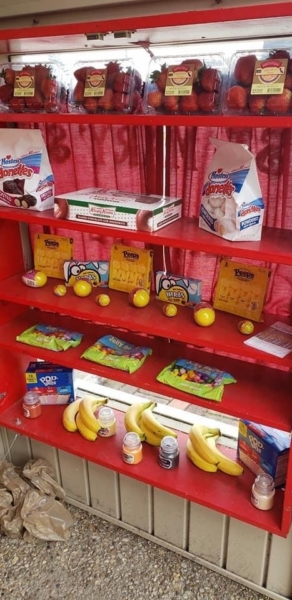Church pantries help Diocese of Indianapolis step up food ministries during pandemicPosted Apr 16, 2020 |
|
[Diocese of Indianapolis] In 2016, parishioners at St. Mary’s Episcopal Church in Martinsville, Indiana, built a tiny wooden pantry in a lighted alcove just outside the front door and hung out a sign saying, “Take what you need. Donate what you can.” And so the Little Free Pantry was born.
Four years later, the pantry is one of several feeding ministries affiliated with Diocese of Indianapolis churches that are still functioning in the midst of the COVID-19 pandemic.

Donations from Martinsville, Indiana, residents help restock the Little Food Pantry for Easter. Photo: Peggy Miller
“I have encountered multiple people making withdrawals and seen the desperation in their faces and heard it in their voices,” Steve Speth, who runs the pantry, wrote in a recent letter to supporters.
Others food ministries fighting hunger in the diocese include The Storehouse Food Pantry, a sizable ecumenical ministry operating at the former site of St. John’s, Speedway; the Mid-North Food Pantry, an ecumenical venture housed in the outreach center at Trinity, Indianapolis; Sister Joanna’s Table at St. Paul’s in Evansville; and the virtual shelf-stocking work of parishioners at St. Matthew’s, Indianapolis.
The economic dislocation caused by the pandemic has intensified the need for feeding ministries, even as necessary safety precautions have made such ministries harder to conduct.
Rich Hoerger, who manages The Storehouse Food Pantry, said last Saturday’s distribution to 273 families, totaling some 1,165 people, was the largest in the pantry’s history, easily eclipsing the 190 families with 928 members served last Thanksgiving.
The pantry was ready for the influx, however, largely because Hoerger watches the news. “I’d go home, turn on the TV, and then I’d call up the volunteers and say, maybe we should pack another 40 boxes.”
He did that twice, and the pantry had almost exactly the right number of boxes ready when cars began to roll, just a few at a time, into the former church building’s parking lot on Saturday.
“We had our regulars and then some,” he said. “There were a lot of people we’d never seen before.”
St. Matthew’s in Indianapolis is in the unique position of having a commercial kitchen, but no on-site food pantry. The parish is home to We Run This, a culinary entrepreneurship program that helps young people learn culinary and business skills. The program, which St. Matthew’s helps sustain through a partnership with the Kheprw Institute, an Indianapolis community empowerment organization, has maintained enough customers to keep its doors open during the pandemic.
“The kitchen has various vendors it works with — a food truck, ice cream guy, a guy who runs a hot dog stand, a new caterer — and they are going in and filling those orders,” says the Rev. Frank Impicciche, rector at St. Matthew’s. “They cook, they package, and then people who ordered it come to the door.”
The parish has had to be more creative in helping to supply two local food pantries on the east side, Community Outreach Ministry East Side (COME) at Cumberland First Baptist Church and Irvington Community Advocacy Network (ICAN).
“We didn’t want to have people driving around, buying things and dropping them off,” Impicciche said, so parishioners went online. Through Amazon, Walmart and other merchants, they supplied COME with paper products, laundry detergent and toiletries and ICAN with canned goods, fruits and vegetables.
Sister Joanna’s Table, a Saturday community meal at St. Paul’s, Evansville, has converted its sit-down dinner to a bag lunch program since the pandemic took hold.
“For the past five Saturdays, while the halls remained empty, devoid of the tables filled with guests, congregations have been providing to-go meals, sometimes hot in takeout boxes, other times bag lunches,” said the Rev. Holly Rankin Zaher, rector at St. Paul’s. “Instead of serving teams of 10 to 15 people, congregations work to minimize exposure and work with a skeleton crew. Instead of a food service line, guests are served through the door with staff running a to-go meal and some bread out to people or cars as they stop by to discourage people congregating.”
Sister Joanna’s Table has been in the area for over 25 years, Zaher said, and it is still feeding people. “Volunteers masked and gloved are making it all work.”
The Mid-North Food Pantry is one of the few feeding ministries that is still able to offer clients some element of choice. The pantry has moved its operations from the basement of the Trinity Outreach Center into the rear parking lot for shifts on Monday, Wednesday and Friday. Clients receive tickets for time entrance and have a chance to consult with volunteer staff about the contents of the bags they receive.
The Rev. Julia Whitworth, rector at Trinity, Indianapolis, said the parish has shifted resources once devoted to its temporarily discontinued Sunday hot meal program to the food pantry, which is now the only in-person, on-site ministry occurring at Trinity.
“We believe more people can get more sustaining assistance through groceries than through one hot meal on Sundays,” she said. The pantry, which usually serves 150 to 200 clients a month, served 600 clients in March. Most clients arrive on foot, Whitworth said.
The pinch created by food shortages is being felt in cities big and small. Before the pandemic, the Little Food Pantry used to get stocked three or four times a week. Now, thanks in part to a grant from the Morgan County Community Foundation, it is being stocked twice a day. The set of shelves in the alcove near the front door is sometimes untended, but Speth said visitors — five to 10 each day — leave notes:
“thank you and god bless you, I don’t know what we would have done”
“thank you so much, even addicts need love”
“we would not have eaten today without you”

Social Menu